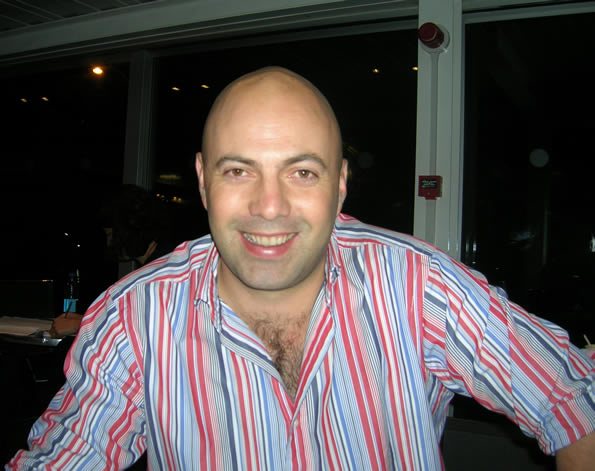|
Ben
Glaetzer: one of Australia's rising stars

I’ve written extensively on this site about the new
generation of Barossa winemakers, but one person I hadn’t
included who certainly should have been is Ben Glaetzer. He’s an
extremely talented winemaker who is turning out some impressive wines.
Significantly, with his various projects he’s making both superb
high end wines, and also some very smart affordable wines.
Ben’s assumed the reins of his family’s Barossa
winery, Glaetzer, fairly recently. ‘I took over the family company
in 2002’, explains Ben, 'and the style change has been marked.’ He
points out that in the era of his father and his uncle (previous
incumbents here), there wasn’t good access to imported wines and
quite of few of that generation didn’t travel. ‘The 1980s saw a
burst of Chardonnays that had undergone malolactic fermentation, which
were rich, full and died.’ People have moved on since then and in
the Barossa they are now making more global wines. ‘Winemakers have
been travelling more, and are eating better food and tasting more
imported wines’, says Ben.
Oak use has been the biggest change. ‘People are
being more selective about what they are using’, Ben reports, ‘it
doesn’t matter whether it is American or French.’ Ben uses oak
from 16 different coopers, most of which is American oak that has been
seasoned in France. ‘I use pretty much all three year seasoned oak,
but aside from the seasoning, it is probably more important finding
coopers who understand toasting.’ He feels that two coopers he uses
understand this completely, and the oak results in lovely structural
components in the wine. Getting good structure is what he looks for in
a barrel: he doesn’t use them for flavour. ‘10 years ago a lot of
these barrels weren’t available in Australia’, Ben explains.
‘I’m paying A$1400 a barrel. It’s a bit like food: the more you
spend the less you want to taste of it.’
When it comes to wine style, the Glaetzer hallmark is
purity of fruit. ‘I’m looking for animated fruit. Wines have to
stay alive. I want the fruit to smell fresh, alive and animated.’
And from tasting his wines, my impression is that this is what sets
them apart. Yes, they are ripe, but you don't encounter that dead
fruit sort of profile that comes from using grapes that have been left
to hang for too long in search of more concentration.
The Glaetzer winery has an impressive capacity, able to
crush 10 000 tons each vintage. 30–40% of it is Glaetzer/Heartland/Mitolo,
the three projects that Ben puts his name to. Around 70% is contract
work. There are 110 individual 2 ton fermenters, together with some 8,
25, 36 and 46 ton fermenters, which gives him the freedom to make the
wines the way he wants, but efficiency is the name of the game with
this sort of volume passing through. There are 5500 barrels.
Everything is done by gravity, with fork lifts being used extensively.
The fermenters are picked up, the contents go through small air bag
presses, and then into barrel.
Mitolo
Mitolo is a relatively new winery that is a collaborative venture
between Ben and a mate of his, Frank Mitolo, which began in 1999.
Frank supplies the capital (and plenty of it: this is a well resourced
venture), which Ben provides winemaking know-how and facilities to
make the stuff in. The grapes come from a grower in Woolunga at the
southern end of the McLaren Vale. The grower’s family is Italian and
knows Frank’s parents. Mitolo started out strategically. ‘We’re
running a business rather than running a winery’, says Ben. The
wines are sensationally good. Reviews can be found here.
Heartland
One of the reasons Ben wanted to set up Heartland is
because he was aware of the amalgamation of companies in the
Australian wine industry, with all wines tasting ‘generic’.
‘They’re less vibrant; less representative of what Australia
offers’, he says. ‘I knew we could do better than that.’
Heartland has five owners. Ben is the major
shareholder, then there’s Grant Tillbrook (accountant), Scot Collett
(who owns Woodstock), Geoff Hardy (viticulturalist) and Vicky Arnold.
There are two others with smaller shareholders, Gino Molino and John
Pargeter (vineyard manager at Greenock Creek).
Heartland own 1000 acres of vineyard, 450 of which are
on the Limestone Coast. As well as using these grapes for the
Heartland wines, some are sold (for example, to make the Zonte’s
Footstep wines). The other 550 hectares are in the Langhorne Creek
region. The vineyards have a slightly different shareholding, but the
majority of this is from the same people who are involved with
Heartland.
What’s impressive about Heartland is the quality of
wines considering their cost and the volume made. These aren’t
expensive, but outclass many wines twice their price.
Ben’s impressed with the wines being turned out by
the new generation of Barossa winemakers, but he also sounds a note of
caution. ‘The major threat to the young guys is scaling up. Are they
going to grow organically?’ he asks. ‘The market is so competitive
that a 250 case production won’t make any money’. He adds,
‘It’s not a lucrative industry: you do it for the lifestyle. The
major challenge is making it work and run as a business.’
See: reviews of the wines of Mitolo,
Glaetzer and Heartland.
Find
these wines with wine-searcher.com
Back to top
|

